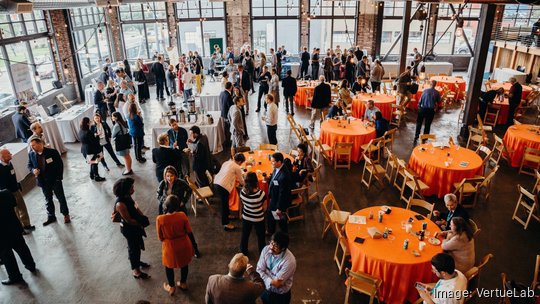
VertueLab has laid off five of its 15 employees and the remaining staff took pay cuts to keep the organization afloat after failing to land funding from a state program.
The climate-focused organization was founded in 2007. It runs an accelerator for clean tech entrepreneurs in partnership with Seattle's CleanTech Alliance and launched a Climate Impact Fund in 2018 that invests in startups. The initial $5 million fund has 13 companies in its portfolio, including Community Energy Labs, Photon Marine and OpConnect.
Since its launch, VertueLab has received funding through Oregon's Signature Research Centers program. State funding has declined in recent years, but it still accounts for a healthy share of the organization's budget.
In 2022, VertueLab received $1.2 million from Oregon, according to its annual report. It had revenue of $2.8 million in the 2021-2022 fiscal year, according to its most recent 990 public filing.
The SRC program has been discontinued and replaced by what's called the Centers for Innovation Excellence. Oregon received 19 applications for funding through CIE totaling $40 million. In September, it awarded $9 million to five organizations.
VertueLab, which had requested $2.33 million, was not among them. The result, said Aina Abiodun, who took over as VertueLab president and executive director in May, was a 50% hit to the nonprofit's budget.
“We are in a position where the organization is healthy and able to withstand the hit and keep 10 staff and regroup,” said Abiodun, who couched the loss of funding as an opportunity to aggressively revamp its work.

“We are in a good position budget-wise, not counting future funding and stuff in the pipeline,” she said. “We are unable to scale or expand anything for the time being. We are going to convene some Oregon funders and talk to them broadly about the strategy where we want to lead.”
VertueLab did receive funding through another Oregon program, the State Small Business Credit Initiative, which is part of the American Rescue Plan Act of 2021. The organization received $1.5 million, funds that need to be matched and that VertueLab has slated for its Climate Impact Fund II.
Abiodun said that after landing the SSBCI funding, she was hopeful CIE dollars would follow.
The CIE program is run by Business Oregon, the state's economic development arm. When asked to comment on the selection process, the agency provided a CIE evaluation memo.
The memo cited the SSBCI funding as one way the state is continuing its support of VertueLab. It also noted that the state supports organizations working in an array of areas, including climate technology, through funding and services outside of CIE.
According to the memo, applicants were broken into three groups based in part on how well the organization's programming aligned with CIE requirements. VertueLab was in group three, which had support but "significant concern."
"The primary areas of concern with these applications had to do with the fit with the CIE model," according to the memo, "the level of impact in Oregon, the lead organization and/or the level of industry involvement."
Abiodun said when she asked why VertueLab was not selected, a representative with Business Oregon said there had been issues with deliverables in past years. Abiodun said it's possible that there may have been a disconnect between the state's expectations around innovation and VertueLab's growing mission to get climate technology into underserved communities.
“The vision is everyone needs to be brought along. There is an opportunity to serve underserved entrepreneurs (but) it’s not just let's help minority entrepreneurs get started,” she said of VertueLab, which is now a Black- and brown-led organization. “It’s about technology and making sure green tech is leveraged in a just, economic way.”
Abiodun holds up Community Energy Labs as an organization whose work matches VertueLab's mission. Tanya Barham’s company helps school districts reduce their energy burden and reaches people that might not otherwise participate in the green revolution, Abiodun said.
“Is it good for the environment? Does it get people on the decarbonization bandwagon and lead to a full green energy solution?” are all questions brought into account with companies like CEL, Abiodun said. “It’s not as sexy as a carbon capture machine, but it has real measurable impact and a role in the journey of decarbonization.”
Abiodun said the Biden Administration’s Justice 40 Initiative for environmental justice and aspects of the Inflation Reduction Act show the federal government is adopting the idea that the climate transition is about more than which companies “make the coolest stuff.”
“I have a feeling if VertueLab did not get forced to take on this task someone would have to take on this task,” she said. “Someone has to invigorate what we are doing in climate innovation in Oregon.”








